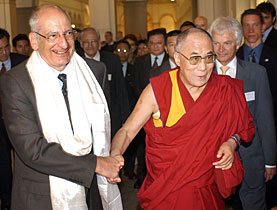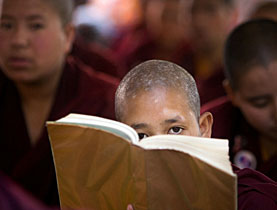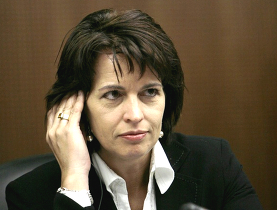Controversy as cabinet sidesteps Dalai Lama

For the first time in a decade the Swiss government has decided against an official meeting with the Dalai Lama when he visits Switzerland in August.
Instead the speaker of the House of Representatives, Chiara Simoneschi-Cortesi, has been asked to welcome the Tibetan spiritual leader, the foreign ministry explained.
How much the decision reflects pressure from China is not certain. Switzerland is home to the biggest Tibetan community in Europe and the spiritual leader arrives in Lausanne on August 4 where he expected to give an address to thousands of people.
It is still possible that cabinet ministers will meet the 74-year-old Nobel Peace Prize winner on an informal basis, government officials said.
The Swiss embassy in Beijing has declined to comment on the move, saying it was awaiting a possible formal response from the Chinese.
It was the same story at the Swiss Chinese Chamber of Commerce in Beijing, whose president Peter Trösch confirmed having discussed the Dalai Lama’s visit with the embassy but was unable to say whether there had been any pressure from the Chinese over the trip.
Forcing the Swiss hand
But there are voices – although strictly anonymous – who argue that Beijing has been leaning on Switzerland.
One source in the business world is quoted as saying it would be a “real pity” if an official meeting between Switzerland and the Dalai Lama “compromised” work underway for a free trade agreement.
It would seem that the pressure has been strong enough for the cabinet not to meet the spiritual leader. In a way, its arm has been twisted.
“We invited the cabinet ministers but none responded positively to our invitation,” said Jon Schmidt, of the committee organising the Dalai Lama’s visit to Lausanne.
He explained that a meeting was planned with Pascal Broulis, chairman of the Vaud cantonal government, parliamentarian Philippe Leuba, and other senior Vaud cantonal officials.
And why no personal welcome from the Swiss foreign minister?
“It’s not a good time, it’s a difficult period, it’s impossible for me, for my colleagues too. We have therefore sought a solution that corresponds to the position and standing of the Dalai Lama,” Foreign Minister Micheline Calmy-Rey told French-language Swiss radio.
She noted that negotiations for a free trade agreement did not come into the discussions.
A foreign ministry spokesman added that Switzerland was not under any pressure from China. “Switzerland is in constant dialogue with the authorities of that country,” said Erik Reumann.
“Appalling”
But the official version has sparked controversy. The Swiss-Tibetan Friendship Association said it was “shocked and saddened” to learn that there would not be an official meeting with a cabinet minister.
And the Switzerland-Tibet parliamentary interest group in Bern wrote to the cabinet calling for it to meet the Dalai Lama. Its vice-president, Swiss People’s Party parliamentarian Oskar Freysinger, was frank in his disapproval: “It’s appalling. The Swiss government is only showing it has no backbone.”
“It only knows how to do one thing: bow down before the world’s powers and apologise for its existence. That is not the Switzerland I am fighting for. Nobody dares stand up to this Chinese communist dictatorial system because there are economic interests at stake and it is easier to sell your soul to the devil than to resist.”
He added: “If the point is to be true to ourselves, to live with our heads held high and to fight for what is right, then this meeting should take place. However, if it is only about showing submission in order to gain some juicy contracts, then no.”
“For my part, I will always support the first option. Otherwise, there is no reason for the sovereign nation that is Switzerland to exist.”
But it must also be remembered that a meeting with the speaker of the House of Representatives is not to be sniffed at.
The Dalai Lama also regularly visits Switzerland for personal reasons. He may have met four cabinet ministers in recent years, but there are also occasions when he does not meet them. Calmy-Rey stresses that he has never received an official government welcome and he is usually met by the culture minister. In the future, “we intend to continue along these lines”, she said.
Alain Arnaud, Beijing, in collaboration with Michel Walter, Bern, swissinfo.ch (translated from French by Jessica Dacey)
Switzerland is home to an estimated 3,500 Tibetans. They are said to form the biggest Tibetan community in Europe, and the third largest in the world.
The beginning of immigration into Switzerland dates back to 1960 with the arrival in the village of Pestalozzi Trogen of ten boys and ten girls and the launch of “1000 homes for Tibetan Refugees in Switzerland”, a programme approved by the government and supported by the Swiss Red Cross.
Between 1961 and 1964, 158 Tibetan orphans were adopted by Swiss families and the community in 1967 launched the construction of the first Tibetan monastery in the west, in Rikon, near Zurich.
Switzerland supports dialogue between the Chinese authorities and Tibetan religious leaders, including the Dalai Lama, says foreign ministry spokesman Andreas Stauffer.
The international community, including Switzerland, recognises Tibet as an autonomous region of China, ranked as a province since 1951, the ministry says.
Switzerland does not recognise the Tibetan government-in-exile based in Dharamsala, India and has no formal contact with its representatives. The ministry argues that only dialogue can resolve the Tibetan issue in a way that is appropriate for an autonomous region and with respect for human rights, including the issue of religious freedom and cultural rights.
Switzerland says Tibet is among its areas of concern which it regularly raises with China.
Switzerland was the first Western country to institutionalise a human rights dialogue with China. This dialogue, launched in 1991, has resulted in regular meetings between the two countries. The tenth round of talks was held in Beijing in July 2008 and the 11th is planned for this summer.

In compliance with the JTI standards
More: SWI swissinfo.ch certified by the Journalism Trust Initiative





You can find an overview of ongoing debates with our journalists here . Please join us!
If you want to start a conversation about a topic raised in this article or want to report factual errors, email us at english@swissinfo.ch.